Estimated reading time: 6 minutes
Table of contents

Introduction
Indiana Cannabis Legalization remains a complex and uphill battle despite growing bipartisan support for medical cannabis reform. While Indiana lawmakers continue to push for legalization efforts, 2025 is shaping up to be another year of legislative stagnation as Republican leaders block cannabis-related bills from advancing.
Legislative Roadblocks in 2025
The Republican-controlled General Assembly effectively shut down cannabis reform in late February, killing a series of bills aimed at decriminalizing or legalizing medical and adult-use cannabis. Despite the legislative session running through April 29, none of these bills received committee hearings, signaling strong resistance from party leadership.
House Speaker Todd Huston reaffirmed this opposition, stating, “I don’t believe in doing … policy based upon revenue. I think you do good public policy, and you deal with the revenue, and that’s the way I feel about the marijuana issue.” This statement reflects a broader reluctance among Indiana’s GOP leadership to acknowledge medical cannabis as a public health issue rather than a financial one.
The Bills That Didn’t Make It
Despite the opposition, bipartisan lawmakers introduced eight cannabis-related bills this session:
Medical Cannabis Bills
- House Bill 1178 – Rep. Jim Lucas (R-Seymour)
- House Bill 1635 – Rep. Jake Teshka (R-North Liberty)
- Senate Bill 341 – Sen. Michael Young (R-Indianapolis)
- Senate Bill 400 – Sen. Greg Taylor (D-Indianapolis)
Adult-Use Cannabis Bills
- House Bill 1332 – Rep. Blake Johnson (D-Indianapolis)
- House Bill 1630 – Rep. Heath VanNatter (R-Kokomo)
- House Bill 1654 – Rep. Zach Payne (R-Charlestown)
- Senate Bill 113 – Sens. Kyle Walker (R-Fishers) & Rodney Pol (D-Chesterton)
These bills reflect growing legislative interest in cannabis reform, but without leadership support, they faced an immediate dead end.
Public Support vs. Legislative Resistance
A significant 87% of Indiana adults support medical cannabis legalization, according to the 2024 Hoosier Survey conducted by the Bowen Center for Public Affairs in November 2024. Despite this overwhelming public backing, Republican leadership remains firmly against reform.
Senate President Pro Tempore Rodric Bray dismissed medical cannabis legalization, stating, “I don’t have people coming to me with really compelling medical cases as to why it’s so beneficial.” He further suggested that medical programs often pave the way for recreational use, reinforcing his resistance.
House Speaker Huston echoed this sentiment, arguing that state legalization efforts are more about generating tax revenue than public health benefits. “I don’t believe public policy should ever be built based off revenue,” he said.
Indiana’s Uncertain Future for Cannabis Reform
With strong opposition from the state’s top lawmakers, Indiana Cannabis Legalization remains a long shot in 2025. However, the significant public support and growing legislative push suggest that reform efforts will persist. Indiana remains one of 24 states that do not allow for citizen-initiated ballot measures, meaning legislative action is the only path forward.
Given these dynamics, Indiana is considered in limbo for cannabis reform in 2025. While the current leadership remains resistant, shifting public opinion and continued legislative pressure could eventually tip the scales.
Indiana Cannabis Legalization 2025 FAQs
While marijuana use is not legal in Indiana, other THC products known as Delta-8, -9 and -10 are legal and readily available at vape shops and other retailers. These products, like tobacco products, are only available for legal purchase to those age 21 and older.
Indiana residents may purchase a wide range of CBD-infused products, including CBD oil, tinctures, gummies and other edibles. This also pertains to products that use hemp-derived Delta 8 — an alternative cannabidiol that falls under the 2018 Farm Bill and the Indiana Hemp Act.
Yes, CBD is legal in Indiana, but it can’t contain more than 0.3% THC and is subject to strict labeling and testing regulations. Indiana has some of the strictest marijuana laws in the United States, and while CBD is allowed, marijuana remains illegal.
Probable cause is the legal standard that law enforcement must meet before they can search your property or person without a warrant. In drug cases, probable cause may be established by things like the smell of marijuana, drug paraphernalia, or an admission of guilt.
Indiana state laws ban any adult use for recreational purposes. Possession of even small amounts of marijuana is a crime in Indiana. Although possession of fewer than 30 grams is a misdemeanor, a first-time offender still faces jail time and a fine for any marijuana possession. Medical marijuana is also illegal.
No. As of 3/2025, Indiana has not legalized recreational marijuana.
Additional Resources
Free eBooks For Cannabis Business Success
Latest Articles
- Missouri Cannabis Licensing & Business Opportunities 2026Missouri has established itself as the premier success story for cannabis in the Midwest, evolving from a standard medical regime to a high-volume adult-use market that exceeded $1.52 billion in annual sales in 2025. As the market enters the 2026–2027 biennium, the landscape is shifting from rapid expansion toward operational maturation and specialized entry.
- North Carolina Cannabis Licensing & Business Opportunities 2026North Carolina remains one of the final significant jurisdictions in the United States without a comprehensive medical or adult-use cannabis program. However, the 2026–2027 biennium is projected to be the most consequential period in the state’s cannabis history. Driven by the formation of the North Carolina Advisory Council on Cannabis and an impending federal “hemp cliff,” the state is moving from a period of passive prohibition toward a structured, albeit highly restrictive, regulatory framework.
- Nebraska Cannabis Licensing & Business Opportunities 2026Nebraska is entering the 2026–2027 biennium at a historic crossroads. Following the 71% voter approval of Initiatives 437 and 438 in late 2024—the largest margin for a medical cannabis initiative in U.S. history—the state is currently standing up its first regulated medical infrastructure.
- Florida Cannabis Licensing & Business Opportunities 2026Florida represents the most capital-intensive and professionally structured cannabis market in the nation. As of 2026, the state is at a crossroads: it is both expanding its mature medical program and preparing for a potential constitutional shift toward universal adult-use access. On November 3, 2026, Florida voters will decide on the Marijuana Legalization Initiative (Amendment 3). Passing this requires a 60% supermajority—a high threshold, but one that polls suggest is within reach.
- Virginia Cannabis Licensing & Business Opportunities 2026As Virginia transitions from its current “possession-only” model toward a fully regulated retail market, the 2026–2027 biennium represents a once-in-a-generation window for market entry. Unlike the vertically integrated “medical-only” regimes of the past, Virginia’s upcoming framework focuses on decentralization, specifically architected to favor small Virginia-based operators over large multi-state corporations.
- Minnesota Cannabis Licensing & Business Opportunities 2026Minnesota is currently undergoing a transformative shift in its cannabis landscape, moving from a semi-regulated hemp-derived market toward a fully comprehensive adult-use framework. Overseen by the Office of Cannabis Management (OCM), the 2026–2027 biennium represents the critical “enforcement phase” where temporary registrations sunset and permanent, merit-based licenses define the market’s long-term leaders.











